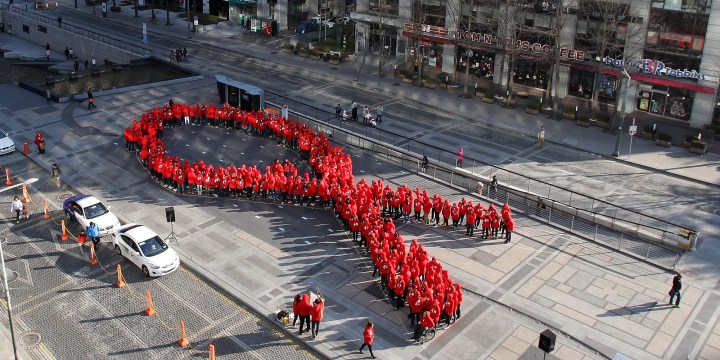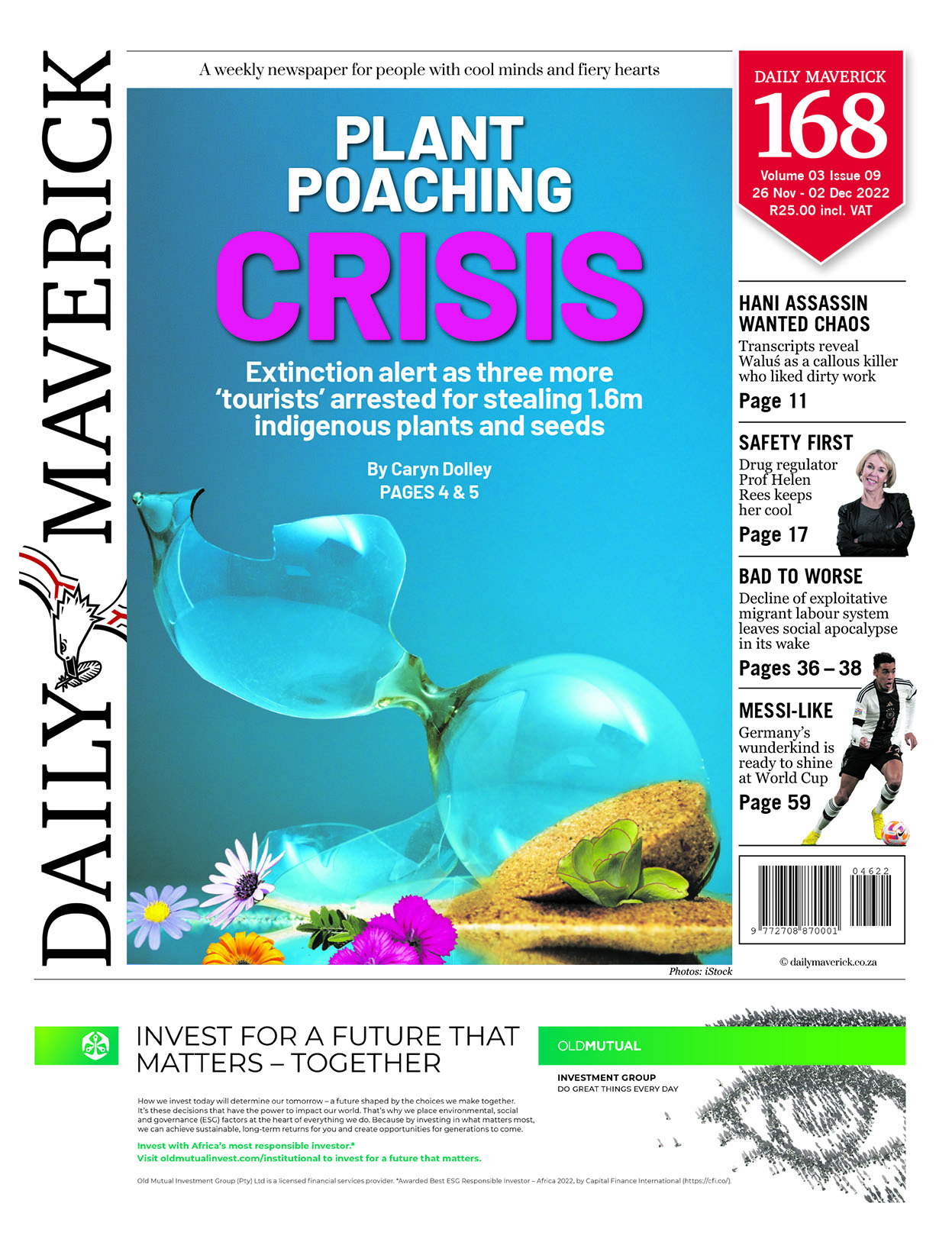REFLECTION
Where Have All the Flowers Gone? – remembering those we loved and lost to the Aids pandemic

In the Eighties and Nineties, before too much was known about the scourge of HIV/Aids, Herman Lategan’s friends began to die, one after another, often alone, their bodies a site of fear. Here they are remembered.
World Aids Day is marked annually on 1 December. Herman Lategan looks back on some of the friends he lost during the Eighties and early Nineties, the initial stages of the pandemic. It’s not only his story, but a wider one about a time of fear, courage, love and loss.
One
It was a warm evening on 2 October 1985. I was relaxing with some friends in a side-street restaurant in Cape Town, called Backstage. It was fashionable with the theatre crowds, thus the name.
There was a piano. One night Mara Louw sang there. Another night a drag queen with sad eyes and a husky voice performed songs by Marlene Dietrich.
Look. Over there are the actors Shaleen Surtie-Richards, Peter Butler and Marthinus Basson. Wave.
People spoke about theatre, agitprop, apartheid. There was a young man with curly hair who came in on a Saturday night.
He would write a poem for you and if you wanted to, you could buy it from him. That’s the sort of place it was. And somehow there was a lone TV set perched on a stand in one corner, which didn’t quite fit into the mood.
The news came on. Rock Hudson was dead. He died of a mysterious gay cancer, called Aids. It was transmitted through sex. It was rampant in the creative community. That was the extent of the information.
For a moment Backstage fell silent. Someone got up and shifted behind the piano. Marlene Dietrich was performing that night. She started and sang: Sag Mir Wo Die Blumen Sind? (Where Have All the Flowers Gone?).
Two
Soon news of friends of friends who fell ill started surfacing in pubs and at dinner parties. They lost weight. They had lesions on their faces. They started dying.
Most of the heterosexual population looked away; it had nothing to do with them. Unprotected sex was still de rigueur. If you fell ill, you were looking for it. It was your decision.
What did we know about condoms? We didn’t even have dating apps. You went cruising in parks, on beaches and in pubs.
Was it safe to touch people? Could you use the same toilet seat? What about kissing? Fellatio? Nobody knew.
We were in a liminal space between two worlds: the one we knew, another we feared.
Three
As a youth I worked in a restaurant called Die Kaapse Tafel, in Queen Victoria Street, Cape Town. Next to the restaurant was the block of flats St Martini Gardens. One day the owner asked me to take a plate of food to someone in that block.
I went, knocked, after a while a thin man with spots over his face opened his door. His hands were flecked and looked like claws. He was unsteady on his feet.
Read in Daily Maverick: “HIV is not over, warns UNAids director for SA after emergency meeting”
He took the plate and thanked me, looking away. I took food for about a month. Each time he looked worse.
One day the owner asked me to stop taking food. He said nothing, but I knew. I never asked his name or what happened.
Four
My partner and I are on our way to Plettenberg Bay. Our neighbours had rented a house next to the sea. Two other people would join us, called Peter and Christopher. When we saw them, we knew that they were sick. But nobody spoke about it.
On the last evening, Peter went on and on about how he was going to build moving pavements, like escalators, to transport the domestic workers to the homes of the rich whites they worked for. He would design them the moment he arrived home. He was, in hindsight, delirious.
That was to be their last holiday, next to the ocean. They both died shortly after that. We went to Peter’s funeral in a church in Rosebank. It was packed.
The then mayor of Cape Town, Patricia Sulcas Kreiner, arrived in solidarity. It was the first time that we could palpably feel someone in power was taking notice.
I remember how she slowly walked down the aisle dressed in black. It was a big day for the gay community. We cried.
By this time, the virus had spread through white, so-called coloured and black communities. We could spot them in the church. The bells rang, the service started.
Five
Peter Moon was a ship’s captain who lived around the corner from us in Green Point. He was a butch man. He knew the sea, the tides, the waves. We called him Moon by day, La Luna by night.
When on land, he would invite us for dinner. The food was awful, mostly boiled veggies. His wine was wonderful. He swore like a sailor and told delightful stories.
His party trick, of which no one took notice, was to take his penis out and swing it around. It looked like a large mushroom. It wasn’t pretty. But no dinner party was conducted without this ritual.
One day Peter said I could take some of his best wines. He started giving things away. Peter was a big man. He, too, started to wilt away.
We knew, but we never spoke about it. It was unsaid. Again the omertà. He sold his flat and moved to a house next to the Marina da Gama, where there is a lagoon.
He lay on a chaise longue staring at the water. Peter had a boyfriend called Connel Fortuin who took over.
Read in Daily Maverick: “War against HIV – we have the drug to stop it, yet the world is at a turning point once more”
One day all his close friends were invited to a party at this house next to the water. We knew it was a farewell.
All was merry. We laughed. Platters of food were passed around. We got pissed on champagne. He loved the music of Michael Franks, who was singing Popsicle Toes.
A woman arrived at the soirée and got undressed, naked. She walked into the lagoon and swam in circles. For a moment it felt like a Federico Fellini movie. People standing around, the indigo water, music, laughter, a blue, blue sky.
For the first time I sat down next to Peter and wept. I held his hand. He cried softly and said: “I don’t want to die.”
That was the last time we saw him.
Six
I’ll call him X, as his family is still in denial about how they treated him to this day and threatened legal action. X was a boerseun from a farm and fled the small life in the platteland by going to New York after school.
There he studied fashion design and lived a large cosmopolitan life, away from the narrow-mindedness of rural life and the injustices of apartheid. He was vibrant, forward-thinking, creative.He enjoyed the nightlife of New York, the clubs, the bars, the steam baths, the bright lights of the big city. After a decade or so he returned to Cape Town and lived in a small bungalow in Clifton.
I spent many weekends there admiring the still, shiny water, the beautiful people. We partied. We were young. Life was good. X also became weaker; it wasn’t noticeable at first.
He turned into a carcass and landed up on the seventh floor of the Somerset Hospital, which was called the Aids floor back in the day. In those days, if you landed up there, the chances of leaving were slim.
People would whisper: “He’s on the seventh floor.” That was the code. You didn’t have to ask any questions. “He’s on the seventh floor” became a mantra. Seven rhymes with heaven, but heaven it wasn’t.
I arrived there one day only to see X lying in his bed surrounded by vomit. Nurses tried their best but couldn’t keep up. The wards were full.
They, too, were scared, as information was scarce. Could you catch it by touching a patient? Incidentally, the suicide rate among gay men spiked for a while.
Visit Daily Maverick’s home page for more news, analysis and investigations
One drove over the cliffs of Chapman’s Peak. When rescuers found the body there was blood everywhere. He left a note. The next day the papers were full of stories on how this man exposed the emergency workers to the “dreaded disease”.
Another man gassed himself next to a road near Table View. A note, another front-page report.
X left the seventh floor. He was lucky. He landed up in a hospice in Gardens. My partner and I used to visit him on Saturdays, with a bottle of wine.
Not one of the many people who partied with him visited him, all those festivities, food, drink, hospitality, but when he became sick, he was persona non grata.
His family came to fetch X. We had no communication with him for about a month. One night, it was cold and wet, a miserable winter, our doorbell rang.
There two very straight-looking men stood and told us in Afrikaans to come down to their car, X was there. The rain came down and drenched us.
Their car was parked under a lamp. The light fell on it as if in a Fifties noir movie. On the back seat was X, paralysed, mumbling.
“Take him,” one man roared in Afrikaans. I remember that our friend Stephanie, who lived near us in Sea Point, had a spare bed.
I ran up to the flat – it was before cellphones – and made a quick call. She was frightened, but said she was ready. They could bring him.
X was dumped at Stephanie like a piece of damaged furniture. They left without even saying goodbye.
Read in Daily Maverick: “Six graphs that tell the HIV story in South Africa”
For the next few days, we popped in and out, and battled; none of us had training to deal with such a patient.
Somehow, he landed up in Karl Bremer Hospital. Before we went to visit, Stephanie phoned to tell us he had passed away. There was a little chapel inside the hospital and we went to his service.
To this day the horror: the only people there were Stephanie, my partner and I, and the priest. He died alone and abandoned, like so many others. Indeed, where have all the flowers gone?
Seven
Then 1999 arrived, the Thabo Mbeki era, and a prolonged period of more grief, the gloomy shades of more deaths and denial. That, I’m afraid, is a story too sad to tell here; for now I leave that for others to write. My heart is on the floor.
But on 1 December let’s remember those who didn’t make it. Allow me to be sentimental and quote Shakespeare: “‘Let me be boiled to death with melancholy.”
Long live our memories of you. DM168
This story first appeared in our weekly Daily Maverick 168 newspaper, which is available countrywide for R25.





















 Become an Insider
Become an Insider
Thank you Hermann for this very poignant piece. I really salute the gay community who had to be strong, who stood alone, who were so stigmatised.